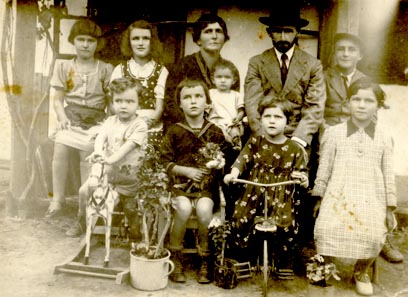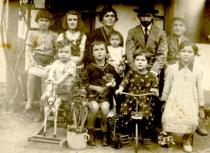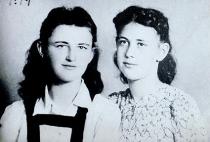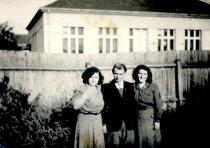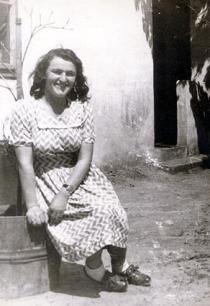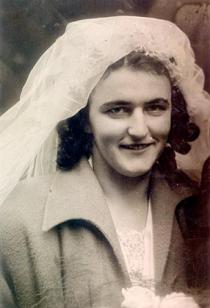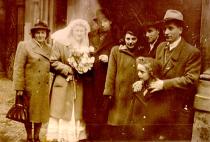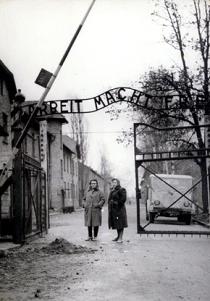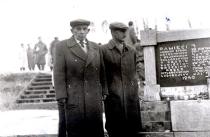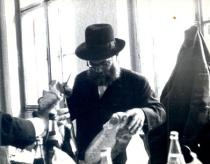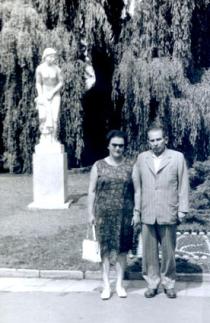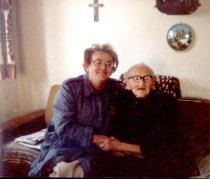This photo was taken in our yard in Felsoszeli in 1936. I don't remember anymore who took it, but I know that my mother had it taken, then sent it off to all of our relatives. The picture came back to me from Prague, from Etelka Tevlovits, my father's younger sister. This picture memorializes our whole family. The youngest, brother Miksa was only born in 1940, so we don't see him yet. The order of names goes from the upper row from right to left, my brother Benci, my father and mother are sitting next to him, she's holding little Gizi in her arms. After Gizi and Mother are me, and Hana. In the lower row, from right to left come Sara, Eszti, Manci and Sauli.
There was great poverty in Subcarpathia. In 1933 and 1934, we moved to Felsoszeli. My uncle, my father's uncle, was employed with the Singer company as a traveling salesman. He travelled the whole of Czechoslovakia. He found out there was a Jewish school in Felsoszeli, but it didn't have the required number of children to receive state support. By the time we stumbled over there, they had the required number, because there were six of us kids, and three of us were already in school. That's how the Felsoszeli Jewish school got state support.
I had eight siblings. Between my oldest brother Beno and the littlest, Miksa, there was a difference of fifteen years. Beno, Hana, Sari [from Sarolta], Manci [from Maria] and Eszti [from Eszter] were born in Dombo. Sandor, Gizike[from Gizella] were born in Felsoszeli, and Miksa was born in Galanta. I only vaguely remember my youngest siblings, since I was with them a relatively short time. My mother took the littlest ones with her in the summer break to Grandma in Dombo, so I didn't see them for three months.
Beno, my oldest brother was a very hard-working kid. He learned the tailoring trade in Szenc. When my father was conscripted into work service [forced labor][10], then he supported the family, by that time already working in Pest [Budapest] in a tailor shop. He passed away during the Second World War. Mother adored him.
My other sister, Sarika, who we called Sara, was a very smart and pretty little girl. She was writing verses at the age of six. I don't really remember Esztike [from Eszter] and Manci. Sandor, who was born Salamon, and whom we called Sauli, was born in the winter of 1935. He was a pretty child. He used to fetch the chulent from the baker for the well-to-do people. He always got a few filler [pennies] for it. He bought Mother a wooden spoon by mistake for her birthday, but started shouting from afar that he'd bought her a salt shaker. We made fun of that for a long time, to this day I still smile to think about it. I don't have memories of Gizike and Miksa, unfortunately. My youngest brother, Miksa was just four years old when he and Mother, Sari, Manci, Eszter and Sandor were gassed.
We lived in a common courtyard with an old woman in Felsoszeli, Miss Paula and a Lutheran family, the Kozaks. Miss Paula had a small textile business. If she needed something, she would send one of us kids to run along after it. Mr. Kozak was a carpenter. He had three families, two girls and one boy. Despite that my parents were on good terms with them, they rarely visited each other. They mutually respected one another's religion. The Kozaks, for example, when they slaughtered, they put flour, eggs and a live duck in the breadbasket. That's what they brought from 'the slaughter'. At Christmas and Easter, they always gave us fruits and walnuts. They never brought brioche, because they knew we couldn't eat it, since it wasn't kosher. I remember that they respected our religion. The courtyard was wide. We had a garden, which we worked. My mother raised poultry and ducks. Beyond the courtyard, the Dudvag [river] meandered.
Father also went often to the mikveh in Felsoszeli, then he was still very religious. My mom went there monthly with the children the same as in Dombo. Aside from that, we had to wash every morning behind a 'Spanish wall'. There was a washbasin and water in it. It took a while for all the children to get washed up. We washed one after the other. Once a week we bathed in a wooden tub. Mother warmed the water outside, of course not everybody got fresh water, just warm water poured on them. In summer, on Friday afternoon we bathed, in winter it was on Thursday since the Sabbath comes earlier in the winter.
